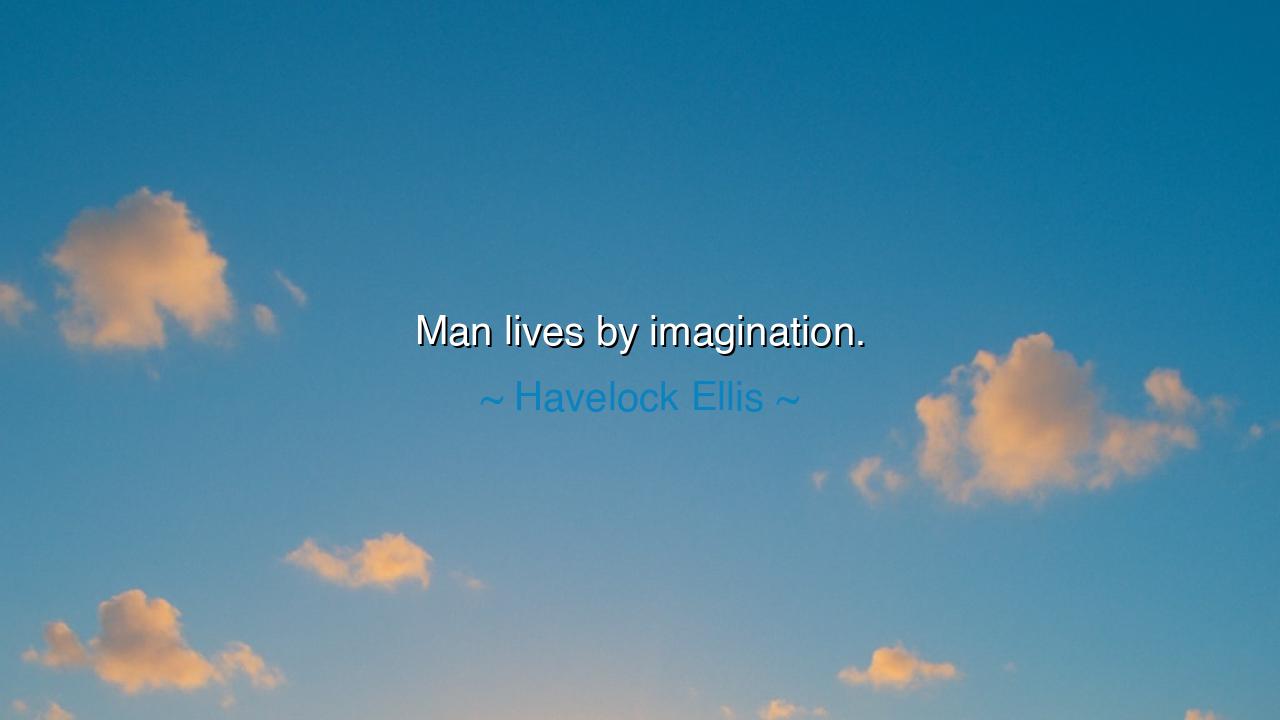
Man lives by imagination.






"Man lives by imagination." Thus spoke Havelock Ellis, the philosopher of human spirit and desire, who saw that the true sustenance of mankind lies not in bread alone, but in the visions of the mind. His words rise like a quiet revelation, reminding us that while the body may feed upon food and air, the soul feeds upon imagination. Without it, life becomes a desert—dry, mechanical, and colorless. With it, the smallest seed of existence blossoms into beauty, meaning, and destiny. Ellis understood that to imagine is to live twice: once in the world as it is, and once in the world as it could be.
The origin of these words lies in the deep human truth that imagination is the breath of civilization itself. Long before man built cities, wrote books, or worshiped gods, he dreamed. He looked at the stars and saw stories in their fire; he looked at the forest and saw spirits in its shade. It was not survival that separated him from the beasts, but his ability to see beyond survival—to turn fear into myth, memory into art, and longing into progress. Every invention, every song, every act of love or courage, begins first as an act of imagination. Thus, Ellis speaks not only as a philosopher, but as a witness to the divine power that animates all human striving.
Consider the story of Wright brothers, who stood in the flat fields of Kitty Hawk and imagined flight when the world mocked them. They were not rich, nor scholars of physics; they were mechanics and dreamers. Yet in their minds, they saw the human body lifted on wings of wood and cloth, soaring where none had gone before. That vision—impossible, absurd, unthinkable—became reality, and mankind learned to conquer the skies. It was not metal or mathematics that first carried us upward—it was imagination. It was the unseen force that gave life to invention, courage to persistence, and wings to humanity itself.
Ellis’ wisdom is not confined to inventors and visionaries; it speaks to every soul that yearns for meaning. Imagination is the power that transforms pain into poetry, struggle into growth, and love into eternity. When a mother soothes her child with stories, when a worker dreams of a better life, when an artist paints not what is seen but what is felt—all are living by imagination. Without it, even the most comfortable life becomes hollow. For imagination gives shape to our hopes and dignity to our suffering. It tells us that what is cannot confine what may be. It whispers, always, “There is more.”
And yet, Ellis’s words carry a deeper challenge: if man lives by imagination, then he also dies without it. A world stripped of dreaming becomes a machine, where men toil without purpose and progress without soul. The modern age, rich in invention but poor in vision, often forgets that technology without imagination is like motion without direction. Imagination does not merely create tools—it creates meaning. To live by imagination is to infuse daily life with wonder, to see the divine spark in the ordinary, to turn each day into a work of art.
Let us then remember that imagination is not fantasy—it is creation. To imagine is not to flee from reality, but to expand it. When Einstein dreamed of riding on a beam of light, he was not escaping the world—he was discovering its hidden laws. When Florence Nightingale envisioned compassion amidst war and filth, she was not dreaming idly—she was reshaping the destiny of care itself. Those who live by imagination do not withdraw from life; they reimagine it into nobler form. For imagination is not weakness—it is the first act of every strength.
So, my children of thought and longing, take Ellis’s teaching as both mirror and flame. Ask yourselves each day: What do I imagine? Do you imagine fear and failure, or courage and creation? Do you see the world as it is, or as it might become through your vision? To live by imagination is to choose meaning over despair, purpose over numbness, and beauty over chaos.
Therefore, let your imagination be your sustenance. Feed it with stories, nourish it with wonder, and trust it when it leads you into the unknown. For man does not live by bread alone—he lives by the dreams he dares to dream. In imagination lies the breath of life, the bridge between mortal and divine. And when the day comes that you find the world dim and ordinary, close your eyes, breathe deeply, and remember Havelock Ellis’s truth: Man lives by imagination—and so long as he imagines, he truly lives.






AAdministratorAdministrator
Welcome, honored guests. Please leave a comment, we will respond soon